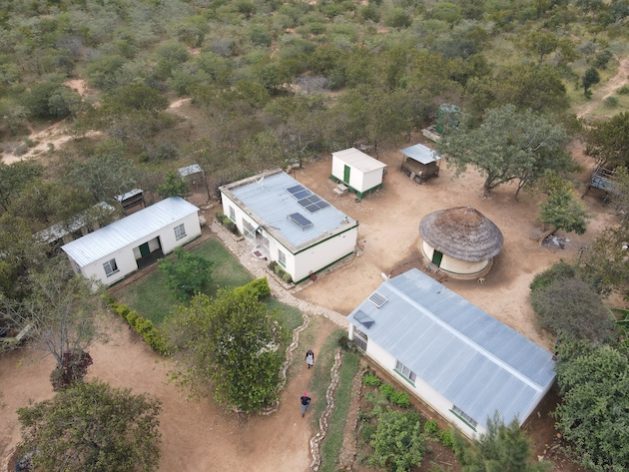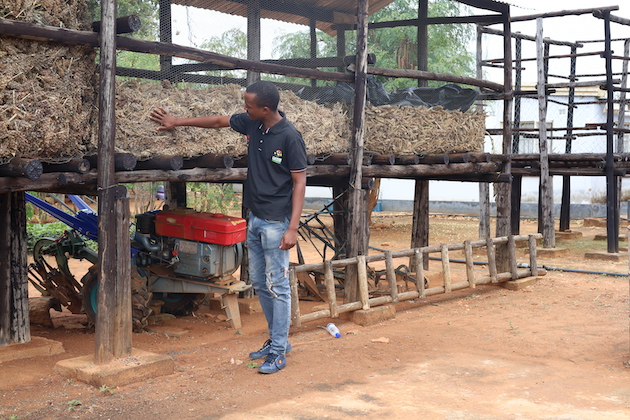Zimbabwean Farmers Turn to Agroecology to Feed Their Families

BULAWAYO, ZIMBABWE, Aug 04 (IPS) - When Nelson Mudzingwa arrived in the Shashe farming area in Mashava in Masvingo, about 294 kilometres from the capital Harare, in the early 2000s, the land was barren, with no hope that the soils could be suitable for farming.
The area used for cattle ranching had turned into a semi-arid.
Livestock was dying due to hunger while trees succumbed to deforestation, and water levels in the nearby Shashe River had decreased because of siltation.
More than two decades later Shashe farming area has transformed into a reputable farming hub.
This was done by employing agroecology techniques, including using locally available resources such as growing traditional grains, rehabilitating the area by planting trees, water harvesting to conserve water and venturing into poultry to get manure to improve soil fertility.
“When I harvest crops in the fields, I make sure that I put aside seed in preparation for the next season,” says Mudzingwa, the 53-year-old small-holder farmer who was born in Chiwundura in Midlands Province, a central part of Zimbabwe.
“By digging contours that channel water in our fields, we have improved the chances of receiving rainfall in Shashe. Even during the dry season, we receive rainfall which was not common when we first arrived.”

Shashe farming area has evolved into a learning area where farmers around Zimbabwe and beyond the borders come to learn agroecology at Shashe Agroecology School, a centre of agroecology, of which Mudzingwa is one of the founders.
Zimbabwe, just like the rest of the southern African region, has been experiencing climate change-induced prolonged droughts and incessant rainfall resulting in floods.
Climate change does not discriminate.
Every living being must pay.
The majority of Zimbabweans live in rural areas, and climate change, caused by human activities, is a major threat to their livelihood.
They rely on agriculture to feed their families as well as earn a living by selling some of the produce.
Government and non-governmental organisations have been working hand in hand to introduce measures that reduce the impacts of climate change.
In Shashe, agroecology farming is basically conserving the land and environment.
This concept involves strengthening the resilience of smallholder farmers through the diversification of agroecosystems.
That is organic soil management and water harvesting for conservation.
In the Shashe farming area, smallholder farmers like Mudzingwa grow a variety of food crops, including grains, cereals, legumes, vegetables, fruit trees and medicinal plants.
They also rear livestock, including cows, sheep, goats, pigs and chickens.
The grains such as sorghum, millet and rapoko are drought-resistant crops meaning smallholder farmers can still have a bumper harvest even during droughts.
Everything on the Mudzingwa’s farm is recycled.
“Livestock are our biggest source of manure. We collect crop residues from the fields and feed the cattle. Then we collect waste and make organic manure in compost,” says Mudzingwa, who is an agriculturist by profession.
The smallholder farmers in this area have fish ponds where they farm different species like catfish and breams.
Mudzingwa says fish farming, poultry, and crops depend on each other for survival.
“We feed fish with chicken droppings and worms. We keep worms in the composts we make for manure. The water from the fish ponds after harvesting is channelled to the garden because it is highly nutritious,” he says.
Another smallholder farmer is Elizabeth Mpofu, who has fed and clothed her three children and one grandchild using proceeds from her agroecology venture in the Shashe farming area.
She turned to sustainable farming after realising that rainfed agriculture was no longer viable in this area; she was resettled following the Land Reform Programme in the early 2000s.
The chaotic Land Reform Programme implemented under President Robert Mugabe saw black farmers taking back their land from the few minority white farmers two decades after Zimbabwe gained its independence from the British colonialists.
Just like Mudzingwa, Mpofu is into fish farming, growing drought-resistant crops like millet and sorghum, poultry and water harvesting to conserve moisture in the fields.
Mpofu keeps seeds for the next agriculture season to ensure that traditional grains critical in providing high yields amid climate change do not run into extinction.
Mudzingwa and Mpofu supply other farmers in Shashe and around the country with seeds and pass agroecology knowledge and skills to them.
Mpofu has planted trees and maintained indigenous trees near her plot as part of her reforestation efforts.
Mpofu’s family relies on agroecology.
She keeps some produce for her family after harvesting and sells the excess to other residents in Mashava or Masvingo, the province’s city.
“Agroecology is the way to go. As a woman, I have been able to look after myself and my family,” Mpofu, a widower, tells IPS.
The agroecology initiative in Mashava and Bikita has reached about 500 smallholder farmers, says Simba Guzha, a regional project manager for Voluntary Service Overseas, a charity supporting farmers like Mpofu and Mudzingwa.
Guzha tells IPS that affordable and less resource-input farming practices like agroecology are important to enhance agricultural production and increase food security at the household level.
“In Zimbabwe, agriculture production is mainly rainfed, and smallholder farmers in marginalized areas contribute more than 70 percent of food production in the country, yet they lack they do not have the financial capacity to purchase synthetic inputs.”
“In Mashava, most soils are loamy sands to sandy which are prone to acidification, leaching and poor structure and can barely support plant life, the use of organic fertilisers and green cover crops that bind the soil help to replenish such soils and enhance microbial activity that supports plant life while sequestering carbon dioxide from the atmosphere.”
Guzha says agroecology in Mashava has empowered women and the youth, who are usually marginalised and vulnerable.
“It has enhanced their productive capacity as well as empowered them to have diversified food sources and income-generating activities,” he says.
“Agroecology promotes growing of indigenous or orphan crops and diversity that are well suited to low rainfall areas like Mashava, hence, farmers are guaranteed of getting something in case of severe droughts. It has promoted local diets and culturally acceptable foods that are nutritious and healthy for the local people.”
IPS UN Bureau Report
Follow @IPSNewsUNBureau
Follow IPS News UN Bureau on Instagram
© Inter Press Service (2023) — All Rights Reserved. Original source: Inter Press Service
Where next?
Browse related news topics:
Read the latest news stories:
- Greenland: A Brief Chronicle of a US Historical Interest Tuesday, April 01, 2025
- UN Staff Put on Alert -- as US Visa Holders Face Threats and Deportation Tuesday, April 01, 2025
- Myanmar earthquake latest: Entire communities flattened, aid teams say Tuesday, April 01, 2025
- Forest Guards Risking Their Lives To Keep Malawi’s Forests Standing Monday, March 31, 2025
- Global Climate Action Progressing, but Speed and Scale Still Lacking Monday, March 31, 2025
- ‘Student Protests Have Sparked Solidarity, Empathy and a Renewed Belief in Collective Action’ Monday, March 31, 2025
- Southeast Asia’s Economies Can Gain Most by Packaging Ambitious Reforms Monday, March 31, 2025
- Myanmar earthquake tragedy ‘compounds already dire crisis’ Monday, March 31, 2025
- Gaza: UN relief chief demands ‘answers and justice’ following killings of first responders Monday, March 31, 2025
- Myanmar earthquake: Search and rescue efforts continue in race against time Sunday, March 30, 2025